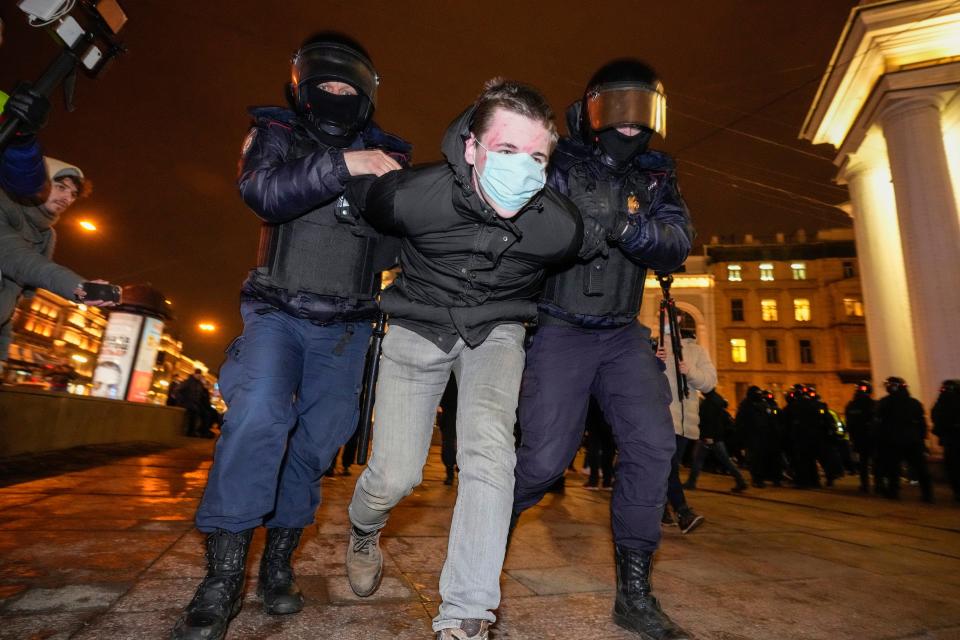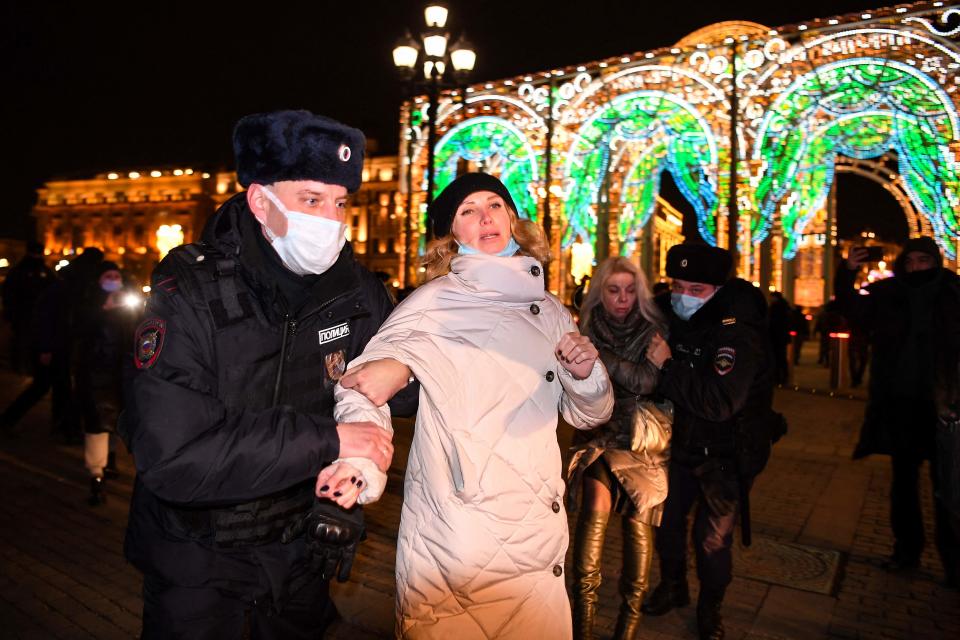In Russia, thousands defy police threats to protest the invasion of Ukraine. Can it make a difference?
- Oops!Something went wrong.Please try again later.
WASHINGTON – Russian President Vladimir Putin's invasion of Ukraine has triggered an earthquake of global condemnation, including in his own backyard, where protests have swelled across the country in a remarkable outpouring of dissent against the Kremlin's deadly military assault.
Antiwar protests erupted within hours of Russia's invasion Feb. 24 in more than 60 cities. The demonstrations, which range from massive rallies to single-person pickets, have continued even amid a fierce Kremlin crackdown.
Police have detained more than 8,000 Russians for antiwar activities since the invasion began, according to the independent monitoring group OVD-Info. Security forces have widened their patrols, looking for dissent in all corners – not just in Pushkin Square, the pedestrian space in central Moscow where most opposition rallies take place.
On Friday, the Russian parliament passed a law that would punish citizens for spreading what the Kremlin calls “fake news” about the military assault on Ukraine. The penalty: up to 15 years in jail.
Kremlin authorities mandated that Russian journalists refer to the assault as a “military operation of demilitarization," essentially banning the term "war."
Some independent media outlets ignored the censors’ demands and continued to describe Russia's invasion as a war – and they've paid a price. This week, the Kremlin shut down a commercial radio station, Echo of Moscow, and the country’s last independent television, Rain TV.
“Authorities shut our radio station down within minutes after the decision,” Olga Bychkova, Echo of Moscow’s deputy editor in chief, told USA TODAY. “They did it without any court process, without explaining any reasons to us."
Before authorities arrived, she said, the station’s journalists gathered in the newsroom to talk about their options.
“We decided to continue working, our team members will continue to get paid,” reporting “objective news” and trying to stream their stories on YouTube, Bychkova said.
On Friday, Russia's federal communication agency announced it would block the websites of the BBC, Voice of America, Radio Free Europe/Radio Liberty and other foreign media outlets for spreading "fake" information.
“It becomes dangerous to cover news in Ukraine" under the Russian parliament's new law, which is “blurry” and “allows authorities to go after anybody,” Bychkova said.
Experts said the domestic unrest does not threaten Putin's iron grip on power. Kremlin officials have repeatedly said this week that the operation in Ukraine would “go to the end.”
But the turmoil could become more problematic for Putin, particularly as the international sanctions slapped on Moscow begin to hit ordinary Russians.
"Vladimir Putin is increasingly fighting two wars: one in Ukraine and one at home," Sam Greene, a professor of politics at Kings College in London and author of "Putin v. the People," wrote in a tweet Thursday. "A week in, neither is going terribly well."
Russians are 'facing real danger'
The past few years have been marked by increasingly draconian restrictions on freedoms of assembly and speech in Russia, experts said, and that's likely to escalate as the war drags on in Ukraine.
Part of the Kremlin's strategy involves plucking random protesters from crowds, detaining them and placing them on a targeted list that is used by police to intimidate people from taking part in protests, said Maria Popova, a political scientist at McGill University in Canada who studies Russian and Ukrainian politics.
"People are taking serious personal risk by showing up for these rallies," Popova said. "In Russia, you're not only taking a risk by showing up to a protest, you're taking a risk of being put on a list and being systematically harassed by authorities for having taking part in a protest."
Human rights activist Svetlana Gannushkina, founder of the Civic Assistance Committee, has documented violations for the past three decades. She said she never could have imagined it would get this bad.
“My own employees are packing and leaving the country in fear of prison; I cannot protect them,” Gannushkina, 79, said in an exclusive interview with USA TODAY.
“There is panic in Russia,” she said. “Men are afraid of mobilization. Thousands of Ukrainian work immigrants are stuck, banned from leaving Russia – they are facing real danger here.”
Some countries wanted to stay neutral: How Russia's invasion has reshaped Europe
Live updates: Russian troops seize site of nuclear plant fire; Western leaders condemn latest attacks
Putin's repression, Navalny's plea
In the 1980s and 1990s – during Soviet leader Mikhail Gorbachev's perestroika reform movement and under Russian President Boris Yeltsin – freedom of speech flourished even as the country struggled with an economic crisis, according to Popova.
With the rise of Putin came a gradual tightening of the screws on civil liberties and freedom of the press. In 2012, he returned to the presidency after serving as prime minister since 2008. The constitution barred him from serving a third consecutive term, a provision he amended to allow him to run again.
By the time Putin took office, the lower house of the Russian parliament, the State Duma, imposed restrictions on unsanctioned demonstrations and has moved to curb freedom of speech, increasing fines and prison sentences for participating in rallies and restricting the presence of nongovernmental organizations.
Thousands of Russian antiwar protesters arrested: What are the freedom of speech laws in Russia?
Putin focused on dismantling organizations linked to Boris Nemtsov, an opposition politician who was shot dead in 2015, and Alexei Navalny, an anti-corruption activist and one of Putin's fiercest critics who was poisoned in 2020 and detained upon his return to Russia last January.
Navalny said his poisoning was a failed assassination attempt orchestrated the Kremlin. Russian officials denied any involvement, but other world powers said they have no doubt the highest levels of Russian government were involved in the poisoning. The U.S. intelligence community determined with "high confidence" that the Federal Security Service used the nerve agent Novichok to poison Navalny.
Navalny's detention sparked widespread protests across Russia. The Biden administration and European allies sanctioned several Russian officials over Navalny's poisoning and his imprisonment.
In the months since, a Russian court outlawed Navalny's Anti-Corruption Foundation (FBK) as "extremist," shutting down the organization and labeling those associated with it as foreign agents, barring them from running for office.
Navalny urged Russians to continue daily protests over Ukraine.
"Let’s at least not become a nation of frightened silent people. Of cowards who pretend not to notice the aggressive war against Ukraine unleashed by our obviously insane tsar," he said in a statement published on Twitter by his spokesperson.
The Kremlin has taken advantage of COVID-19 restrictions to limit public assembly in the latest acceleration of Putin's repressive tactics, according to Kathryn Stoner, a Stanford University political science professor and author of "Russia Resurrected: Its Power and Purpose in a New Global Order."
"He's pretty systematically decapitated the mechanisms by which you might mobilize large numbers of people against the policy and has created deterrence against protesting because the cost is so high," Stoner said.
Popova said the past several years "are way worse than they have been at any point since Stalinist time," referring to Soviet dictator Josef Stalin.
Still, there is greater freedom for dissent than in the Soviet years. In 1917, one of the first decisions by the Bolsheviks was to ban criticism of authorities with the Decree of Press.
The dangers in covering Ukraine
In Ukraine, civilians said they hope Russians will seek out accurate information about the devastation Putin has wrought on Russia's neighbor.
“We need journalists to report on the ground, we need the world to help us," said Galina Odnorog, who is worried about her daughter in Mariupol and volunteered to help her country's army.
Popova said there's a lot of uncertainty about where the majority of the Russian population stands because the Kremlin's propaganda machine is so pervasive and older generations in particular rely on state-sponsored television for their news. That makes it difficult for many Russians to get an accurate picture of what is happening in Ukraine and why.

Before the invasion, 60% of Russians said the United States and NATO were responsible for rising tensions in eastern Ukraine, according to a poll in February by the Levada Center, an independent pollster in Russia. Fewer than 5% laid blame on the Kremlin.
"This information battle is being waged right now," Popova said.
Though trust in state-sponsored media is low in Russia, trust in other outlets is even lower, said Hannah Chapman, a political science professor at Miami University and faculty associate at the Havighurst Center for Russian and Post-Soviet Studies.
Gaining access to alternative sources of information has become difficult as the government restricted access to social media, including Facebook and Twitter, further obscuring information about what's happening in Ukraine.
"But as the conflict drags on and the official message continues to depart from reality on the ground, it may become less persuasive," Chapman said.
Hope in the streets
Despite the crackdown, Russian opposition groups have organized more antiwar rallies, including one for March 6 and March 12.
“I believe that now, when it’s obvious to all of us that Russia might mobilize all young men to this war, any antiwar protester is valuable,” Gannushkina said.
She recalled the aftermath of World War II, which killed more than 10 million people in the Soviet Union, when German soldiers were pushed down Moscow’s streets outside her home.
“I wonder now who … will feel sorry for Russian soldiers sent to Ukraine – many of them are not even aware what is coming,” she said.
Putin is not immune to public pressure, Chapman noted. Though he's taken steps to shore up his support over the past 22 years, his popularity relies on Russia's economic prosperity and domestic stability – both of which have unraveled in the past week.

Western allies imposed punishing economic sanctions that have rippled through the Russian economy, sending the ruble tumbling and interest rates soaring. Russians have stood in long lines to withdraw money from ATMs while vacations are cut short or canceled after more than 30 countries closed their airspace to Russian aircraft.
The sanctions, which will hit not only oligarchs but ordinary Russians, could exacerbate mass protests and lead to bigger crowds as they further erode Russia's economy, Stoner said.
"All of the gains since the collapse of the Soviet Union 30 years ago are being lost here," she said. "They may face not just recession but depression for a war they weren't consulted about and didn't know was coming – at what point do you go out into the street and risk arrest or worse?"
Although there is a brutal crackdown on free speech, demonstrations in lesser circumstances have forced the Kremlin to change tack, according to Stoner. Putin softened his plan to change the retirement age for women from 55 to 63, instead changing it 60 after public outcry and a slip in his approval ratings over the issue, she noted.
More: Where US, allies have targeted the dozens of sanctions against Russia
'It will be a lot harder on people': How sanctions will impact ordinary Russians
For Putin, who concentrates all his power within himself instead of government institutions, a change in public opinion could be his demise.
"These regimes look very solid until the very last moment before they collapse," Popova said. "Even if we're not seeing major cracks, we're not going to see them gradually develop, it will happen suddenly."
"We're not seeing it now," she cautioned, "but it is possible that if this becomes a major social mobilization that it could be the force that changes the course."
This article originally appeared on USA TODAY: Can Russian protests against war in Ukraine change anything?

